Custom High Voltage Ceramic Insulators Manufacturing
AT-Machining offers an extensive range of precision-crafted high voltage ceramic insulators designed for analytical applications, lasers, power tubes, high voltage bushings, electrical transmission systems, medical imaging devices, aerospace components, and other specialized configurations.
Save 30% Cost on average!
Overview of Ceramic Insulators
Ceramic insulators are vital components in electrical and industrial applications, offering exceptional insulation and protection against high voltages. Crafted from advanced ceramic materials, these insulators exhibit superior thermal resistance, mechanical strength, and electrical durability. Precision-engineered to meet specific requirements, ceramic insulators ensure safety, reliability, and efficiency in various configurations, making them indispensable in modern infrastructure and cutting-edge technologies.

Elevate your electrical systems with our custom ceramic insulators. Precision-engineered for high voltage applications. Contact AT-Machining now for unmatched quality, durability, and performance. Let’s power your innovation together!
Types of Ceramic Materials for Insulators
Ceramic insulators are crafted from porcelain, alumina, silicon nitride, and zirconia. These materials provide high electrical resistance, thermal stability, and mechanical strength, ensuring reliable performance in various applications.

Alumina (Al₂O₃)
Excellent electrical insulation and high thermal conductivity. Widely used in power transmission and electronics for durability and wear resistance.

Silicon Carbide (SiC)
Superior thermal resistance and mechanical strength. Ideal for high-temperature, high-voltage environments in industrial and advanced electrical systems.

Zirconia (ZrO₂)
Exceptional electrical insulation and thermal stability. Suitable for medical imaging, aerospace components, and high-performance electrical devices.
Properties of Ceramic Insulators
- Thermal resistance: Ceramic insulators effectively withstand high temperatures, preventing heat transfer and maintaining performance in extreme conditions.
- Durability: Highly durable, ceramic insulators resist wear, corrosion, and physical damage, ensuring long-lasting functionality in demanding environments.
- Electrical insulation: Exceptional electrical insulation properties, ceramic insulators prevent electrical leakage and enhance safety in high-voltage applications.


Custom Manufacturing Techniques for Ceramic Insulators

Casting
Casting ceramic insulators involves pouring slurry into molds for complex shapes, with tight tolerances of ±0.05 mm, suitable for all scales.

Sintering
Sintering boosts ceramic insulators' strength and resistivity by heating at 1400°C-1600°C, increasing density to 98%, ensuring reliability under extreme conditions.

CNC Machining
CNC machining crafts intricate insulator shapes with ±0.01 mm accuracy and smooth finishes below 0.8 μm Ra for high-performance use.
Gallery of Our Manufactured Ceramic Insulators
AT-Machining, with 20 years in ceramic insulator manufacturing, utilizes advanced CNC machines achieving ±0.01 mm precision and produces over 800 high-quality units daily, ensuring reliable performance for industrial applications.
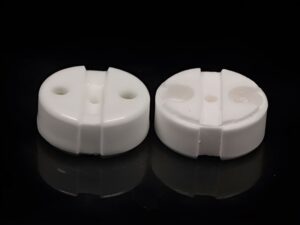
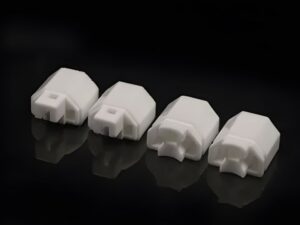
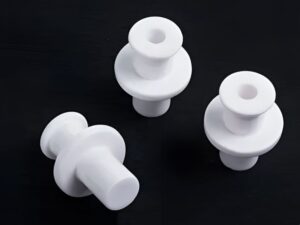
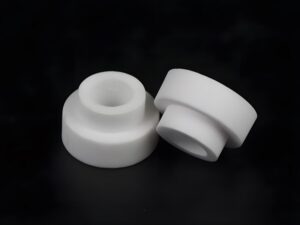
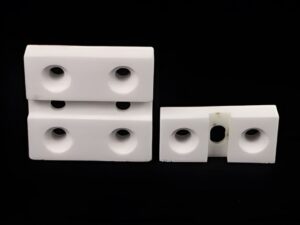
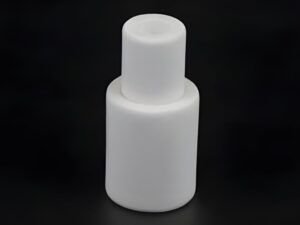
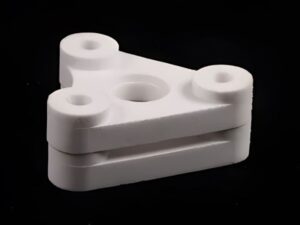
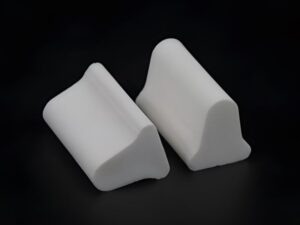
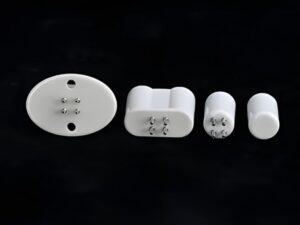
Applications of Ceramic Insulation
Ceramic insulators provide 95% electrical reliability, withstand temperatures up to 1200°C, and reduce component weight by 15%, enhancing safety and performance in aircraft and spacecraft systems.
In automotive applications, ceramic insulators achieve 99% heat resistance, decrease electrical failures by 30%, and improve engine efficiency, contributing to longer vehicle lifespans and enhanced performance.
Ceramic insulators in the energy sector offer 98% reliability, endure high voltages up to 500kV, and lower maintenance costs by 25%, ensuring stable and efficient power transmission and distribution.
Used in medical imaging, ceramic insulators enhance signal clarity by 20%, provide thermal stability, and ensure 99.5% device reliability in MRI and CT scanners, improving diagnostic accuracy.
In laser technology, ceramic insulators deliver 99% thermal resistance, boost beam stability by 15%, and extend device lifespans by 40%, ensuring precise and reliable laser performance in various applications.

Why Choose AT for Your Ceramic Insulation Manufacturer
Precision CNC Machining
Utilizes state-of-the-art CNC machines achieving ±0.005 mm accuracy, ensuring exact specifications for high-performance ceramic insulators.
Material Expertise
20 years of experience with alumina, silicon carbide, and zirconia, providing tailored solutions for diverse industrial applications.
Fast Turnaround
Delivers orders within 5-7 days, producing over 800 units daily to meet urgent project deadlines efficiently.
Cost-Effective
Offers competitive pricing with bulk discounts, reducing manufacturing costs by up to 30% without compromising quality.
Rapid Prototyping
Provides prototype development within 3 days, enabling quick testing and iteration for optimal ceramic insulator designs.
Quality Assurance
Implements rigorous testing protocols, achieving a 99.9% defect-free rate to ensure reliable and durable ceramic insulation products.
FAQs about Ceramic Insulators Manufacturing
Ceramic insulators are primarily made from high-purity alumina (Al₂O₃) or porcelain. These materials are chosen for their excellent electrical insulation properties, mechanical strength, and resistance to environmental factors. Additives like silica, magnesia, and alumina may be incorporated to enhance specific characteristics.
- Mixing and Batching: Combining raw materials in precise proportions.
- Forming: Shaping the mixture through methods like extrusion, pressing, or casting.
- Drying: Removing moisture to prevent defects during firing.
- Firing (Sintering): Heating the shaped insulators at high temperatures to achieve desired properties.
- Glazing and Finishing: Applying protective coatings and performing surface treatments.
- Quality Control: Inspecting for defects and ensuring compliance with standards.
- Raw Material Testing: Ensuring the purity and consistency of input materials.
- Process Control: Monitoring temperature, pressure, and other parameters during manufacturing.
- Non-Destructive Testing (NDT): Techniques like visual inspection, ultrasonic testing, and electrical testing to detect flaws.
- Environmental Testing: Assessing performance under various conditions such as temperature extremes, moisture, and pollution.
- Compliance with Standards: Adhering to international standards like IEC, ANSI, and others.
- Superior Electrical Insulation: High resistance to electrical current leakage.
- Durability: Long lifespan with minimal maintenance.
- Weather Resistance: Excellent performance in harsh environmental conditions, including UV exposure and pollution.
- Mechanical Strength: Capable of supporting heavy loads without deformation.
- Versatility: Suitable for various applications in power transmission, distribution, and industrial settings.
- Advanced Materials: Development of composite ceramics and nanomaterials to enhance performance.
- Smart Insulators: Integration of sensors for real-time monitoring and predictive maintenance.
- Eco-Friendly Manufacturing: Adoption of sustainable practices and reduction of carbon footprint.
- Automation and AI: Implementation of automated production lines and artificial intelligence for process optimization.
- Enhanced Design Techniques: Utilizing computer-aided design (CAD) and 3D printing for more complex and efficient insulator geometries.